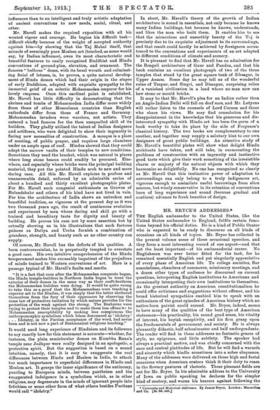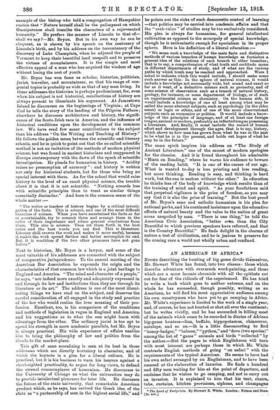MR. BRYCE'S ADDRESSES.*
THE English ambassador to the United States, like the United States ambassador to England, fulfils certain func- tions beyond his official duties. He is a kind of Public Orator who is expected to be ready to discourse on all kinds of occasions on all kinds of topics. Mr. Bryce has collected in the present volume some of these occasional speeches, and they form a most interesting record of one aspect—and that not the least important—of his ambassadorial career. No Englishman was ever better fitted for the task, for he remained essentially English and yet singularly appreciative of every phase of American life. To college societies, Bar associations, chambers of commerce, missionary meetings, and a dozen other types of audience he discoursed on current questions, interpreting Englisk institutions to Americans and occasionally interpreting their own institutions to themselves. As the greatest authority on American constitutionalism he could offer criticisms and suggestions without offence, and his broad historical sympathies enabled him to speak with an enthusiasm of the great episodes of American history which no native-born patriot could exceed. Mr. Bryce, indeed, seems to have many of the qualities of the best type of American statesman—his practicality, his sound good sense, his vitality of interest, his boyish receptivity, and his firm grasp upon the fundamentals of government and society. He is always pleasantly didactic, half schoolmaster and half undergraduate. The reader will find in these addresses no fantastic graces of style, no epigrams, and little subtlety. The speaker had always a practical motive, and was chiefly concerned with the sane and central platitudes of life. But he will find a warmth and sincerity which kindle sometimes into a sober eloquence. Many of the addresses were delivered on those high and festal occasions when American orators think it their duty to roam in the flowery pastures of rhetoric. These pleasant fields are not for Mr. Bryce. In his admirable address to the University of Iowa on public speaking he declares for the simpler kind of oratory, and warns his hearers against following the • University and Historical Addresses. By James Bryce. London : Macmillan and Co. Va. 6d. net.]
example of the bishop who told a congregation of Hampshire rustics that "Nature herself shall be the palimpsest on which
Omnipotence shall inscribe the characters of a rejuvenated humanity." He prefers the manner of Lincoln to that of—
shall we say P—Mr. Bryan. But in his own way he can be eloquent, as is shown by his speech on the centenary of Lincoln's birth, and by his address on the tercentenary of the discovery of Lake Champlain, when he adjured the people of Vermont to keep their beautiful land unspoilt and to preserve the virtues of mountaineers. It is the simple and most effective appeal of a man who has acquired the wisdom of age without losing the zest of youth.
Mr. Bryce has won fame as scholar, historian, politician, jurist, traveller, and mountaineer, so that his range of con- genial topics is probably as wide as that of any man living. In these addresses the historian is perhaps predominant, for, even when his subject is not historical, recollections of history are always present to illuminate his argument. At Jamestown Island he discourses on the beginnings of Virginia ; at Cape Cod he tells the story of the landing of the Pilgrim Fathers ; elsewhere he discusses architecture and history, the signifi- cance of the Scoto-Irish race in America, and the influence of historical conditions upon the development of the common law. We have read few saner contributions to the subject than his address "On the Writing and Teaching of History." He follows the golden mean between the scientific and literary schools, and he is quick to point out that the so-called scientific method is not an imitation of the methods of modern physical science, but was found in ancient historians and reappeared in Europe contemporary with the dawn of the epoch of scientific investigation. He pleads for humanism in history. "Aridity raises no presumption of accuracy" : and history is written not only for historical students, but for those who bring no special interest with them. As for the school that would raise history to the level of an exact physical science, the trouble about it is that it is not scientific. "Nothing accords less with scientific principles than to treat as similar things essentially dissimilar." And here is the common sense of the whole matter :—
"The writer or teacher of history begins by a critical investi- gation of the facts. This is science, and one of the most difficult branches of science. When you have ascertained the facts as far as ascertainable, try to connect them and arrange them in the order of their importance and educe general conclusions from them. This also is science. Then set them forth in the best order and the best words you can find. This is literature. Literary skill crowns the work and makes it more useful, because it makes the work spread farther and better accomplish its end. But it is worthless if the two other processes have not gone before."
Next to historian, Mr. Bryce is a lawyer, and some of the most valuable of his addresses are connected with the subject of comparative jurisprudence. To the annual meeting of the
American Bar Association he expounds the origin and the characteristics of that common law which is a joint heritage to England and America. "The mind and character of a people," he says, "are indeed more exactly and adequately expressed in and through its law and institutions than they are through its literature or its art." The address is one of the most illumi- nating things we have read on the subject, and deserves the careful consideration of all engaged in the study and practice of the law who would realize the true meaning of their pro- fession. Excellent, too, is his comparison of the conditions and methods of legislation in vogue in England and America, and his suggestions as to what the one might learn with advantage from the other. The ordinary jurist is too apt to spend his strength in mere academic parallels, but Mr. Bryce is always practical. His wide experience of affairs enables him to bring the philosophy of law and politics from the clouds to the market-place.
This gift of sane moralizing is seen at its best in those addresses which are directly hortatory in character, and of which the keynote is a plea for a liberal culture. He is practical, but it is his business to warn his hearers against a short-sighted practicality, to argue for long views, to defend the eternal commonplaces of humanism. He discourses to the University of Chicago on what the universities may do to provide intellectual pleasures for later life. He discusses the-future of the state university, that remarkable American product which, as he says, has revived the Greek idea of the sfate as" a partnership of men in the highest social life," and
he points out the risks of such democratic control of learning
—that politics may be carried into academic affairs and that the " cash-value " of studies may be too exclusively considered His plea is always for humanism, for general intellectual cultivation as opposed to the monopoly of special knowledge, though he is enthusiastic enough for specialism in its proper sphere. Here is his definition of a liberal education :—
" We mean such a knowledge of the main facts and distinctive methods of various branches of human knowledge as furnishes a general idea of the relations of each branch to other branches ; that is to say, a comprehension of what truth and certitude mean in different departments of study, and of what are the various paths by which truth may be reached and approached. Were I asked to indicate which this would include, I should make some such answer as this : In the sphere of natural science, it would. include a knowledge not necessarily wide, but sound and exact so. far as it went, of a deductive science such as geometry, and Of some science of observation such as a branch of natural history,, geology, for instance, or SOW department of biology, or of such an experimental science as chemistry. On the human side, it would include a knowledge of one at least among what may be called the more abstract subjects, such as psychology (in the older sense) or logic or ethics, and of one of the more observational subjects such as economics or politics. It would include a know- ledge of the principles of language, and of at least one foreign tongue, ancient or modern, preferably an inflected tongue possessing- a literature. And, finally, it must include the record of human effort and development through the ages, that is to say, history,. which shows us how man has grown from what he was in the past to be what he is in the present, and holds out hopes of what he may be in the future."
The same spirit inspires his address on "The Study of Ancient Literature," one of the sanest of modern apologies for the classics. And it is found throughout his admirable "Hints on Reading," where he warns his audience to beware of the reading habit. "It is one of the curses of our age. '
What is wanted to-day is less printing and less reading, but more thinking. Reading is easy, and thinking is hard work, but the one is useless without the other." In education he thinks less of the body of knowledge which results than of the training of mind and spirit. "As your forefathers said that perpetual vigilance is the price of freedom, so you may say that it is also the price of learning." But the best proof of Mr. Bryce's sane and catholic humanism is his plea for national parks, and his continued insistence upon the educative effects of natural beauty and the value to the nation of great areas unspoiled by man. "There is one thing," he told the American Civic Association, "better even than the City Beautiful to which previous speakers have referred, and that is the Country Beautiful." He finds delight in the charms of nature a test of civilization, and he is jealous to preserve for the coming race a world not wholly urban and confined.











































 Previous page
Previous page